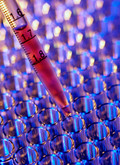Biosimilars/Research
Biosimilar education gaps in oncology
A survey administered by the International Society of Oncology Pharmacy Practitioners (ISOPP) identifies key educational needs on biosimilars amongst its practitioners, including how to compare a biosimilar to an originator and how to manage switching [1].
Non-innovator biologicals in India: regulatory context and areas for improvement
There are major regulatory lapses in the manufacturing of similar biologics in India. The use of scientific audits could strengthen the regulatory system and improve the provision of high quality biosimilars in the country, according to a recent opinion piece [1] by Dr GR Soni, which was published in GaBI Journal.
Clinical trials for adalimumab biosimilar SB5
The clinical trials used to support the approval of Samsung Bioepis/Merck’s adalimumab biosimilar SB5 (Imraldi/Hadlima), were critically reviewed by authors from Argentina and the UK, with a special focus on rheumatoid arthritis (RA) [1].
Clinical trials for adalimumab biosimilar BI 695501
The clinical trials, especially those in rheumatoid arthritis, used to support the approval of Boehringer Ingelheim’s BI 695501 (Cyltezo), were critically reviewed by authors from Argentina and the UK [1].
Clinical trials for adalimumab biosimilar ABP 501
The clinical trials used to support the approval of Amgen’s ABP 501 (Amjevita/Amgevita/
Solymbic) were critically reviewed by authors from Argentina and the UK [1].
Clinical trials supporting the approval of adalimumab biosimilars
Authors from Argentina and the UK critically review the evidence from trials of biosimilars in rheumatoid arthritis (RA) [1].
Assessment of biosimilarity for monoclonal antibodies
How therapeutic monoclonal antibody biosimilars are assessed for biosimilarity, was discussed by authors from the National Institute of Health Sciences and the Yokohama University of Pharmacy in Japan. Their review covers the basic concept of biosimilar development as well as pharmacokinetic data obtained via non-clinical and clinical studies of biosimilar therapeutic antibodies [1].
Positive phase III results for Hisun’s adalimumab copy biological
Positive results were reported from a phase III trial of an adalimumab copy biological, HS016, which compared the candidate adalimumab copy biological HS016 with originator adalimumab Humira for the treatment of active ankylosing spondylitis (AS) [1].
Cost savings from the use of biosimilars in Canada
Analysis of the potential cost savings from the use of three biosimilars (filgrastim, infliximab and insulin glargine) in Canada shows that over CA$1 billion could have been saved in just a two-year period [1].
PK and PD similarity between pegfilgrastim biosimilar and Neulasta
Hexal AG has published phase I results for its approved pegfilgrastim biosimilar [1-3].













